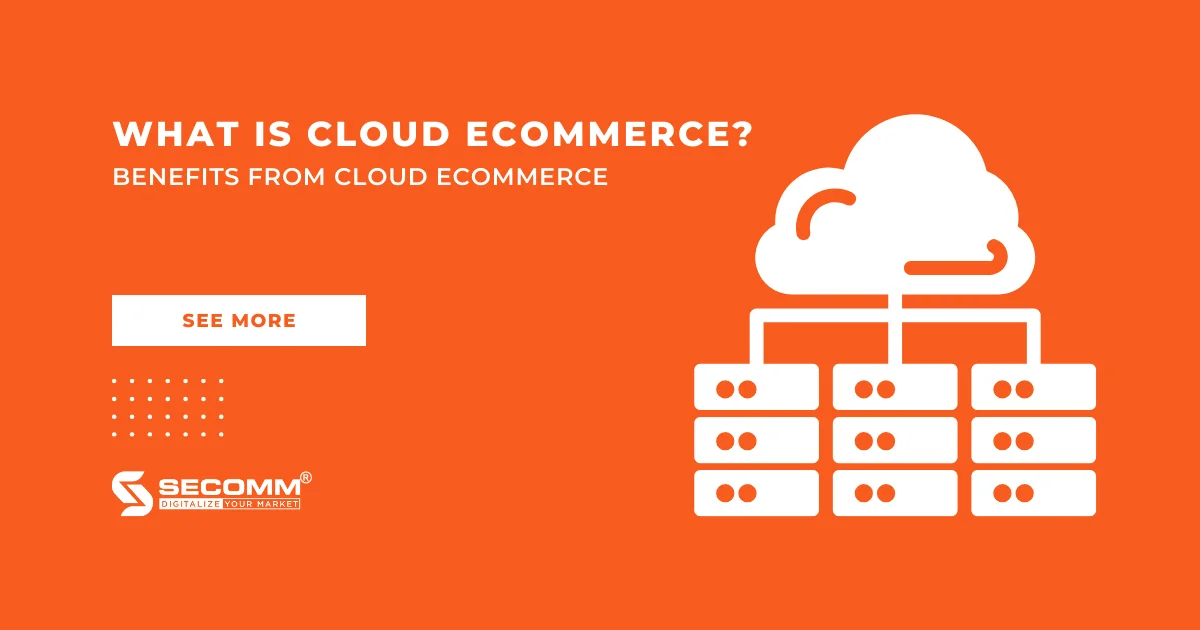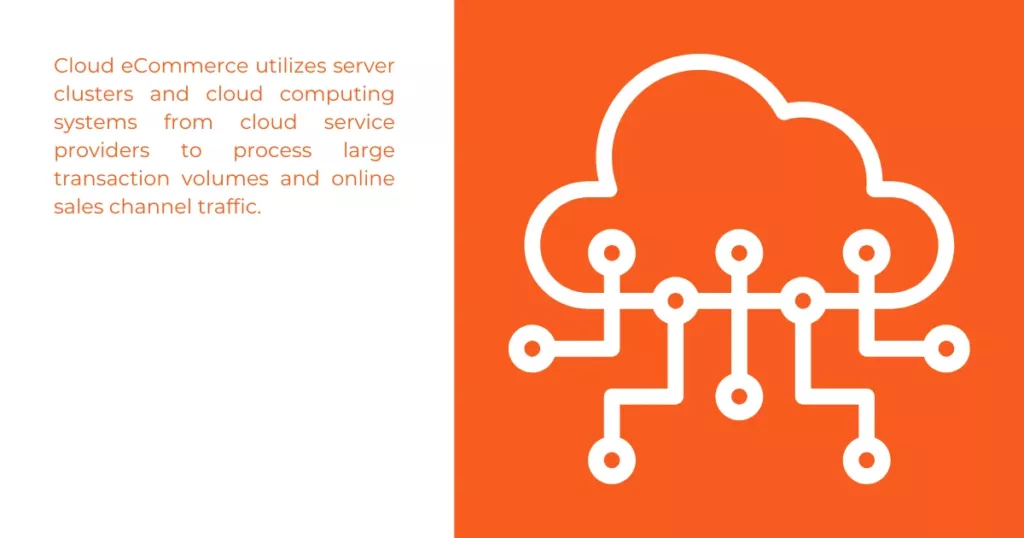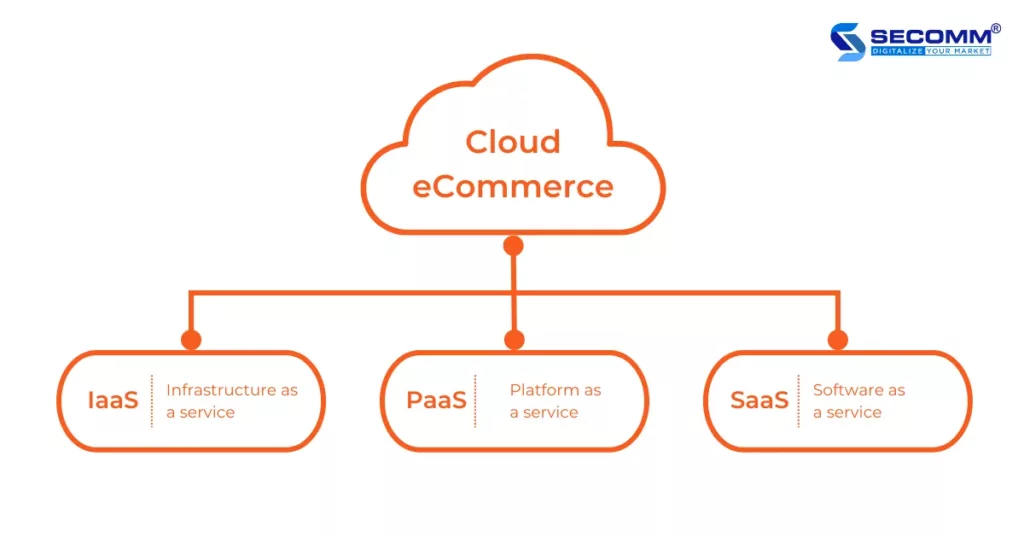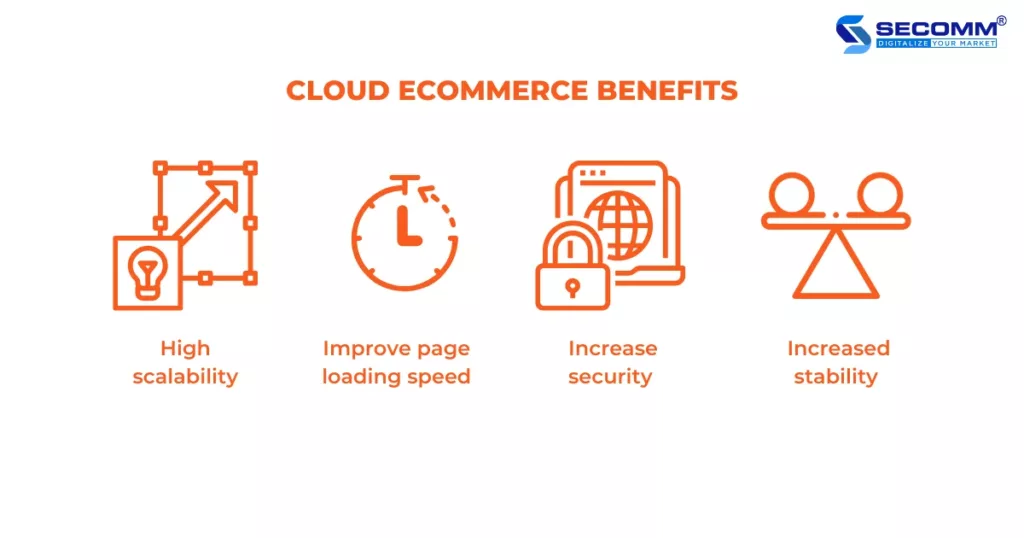It seems we can’t find what you’re looking for. Perhaps searching can help.
Sign Up for newsletter!
Subscribe to get the latest eBook!
Hotline







eCommerce has been booming more than ever, driving the demand for new technologies to adapt to the continuous growth of the market. Some emerging eCommerce technologies include VR/AR, MSI (Multi-Source Inventory), PWA (Progressive Web Apps), Headless Commerce, etc. However, among these, the technology that developers and businesses are currently paying the most attention to is Cloud eCommerce.
Cloud eCommerce utilizes server clusters and cloud computing systems from cloud service providers to process large transaction volumes and online sales channel traffic. In simpler terms, Cloud eCommerce involves renting Internet servers based on cloud platforms to process, store, or use applications for various eCommerce business purposes.

Before cloud-based eCommerce platforms and other solutions emerged, traditional eCommerce platforms like IBM WebSphere and Oracle ATG required on-premise server setups and continuous maintenance. Unlike those “on-premise” eCommerce solutions, cloud-based eCommerce allows companies to outsource their IT infrastructure without the need to invest in equipment and continuous maintenance as before.
This solution helps businesses adapt to the increasing demands of customers, enhance security, simplify maintenance, and integrate new eCommerce applications as needed. For these reasons, Cloud eCommerce is often combined with eCommerce platforms such as Shopify Plus, Salesforce, Magento, etc.
There are several cloud eCommerce solutions to choose from, including IaaS, PaaS, and SaaS, each with different resource requirements.

Infrastructure as a Service (IaaS) is where businesses rent physical resources such as servers, databases, and network equipment to build a sustainable eCommerce architecture. IaaS eCommerce focuses on providing on-demand data storage on disks and virtual servers, making it easy for businesses to use database services rather than dealing with hardware. However, businesses are responsible for managing applications, data, runtime, middleware, and the operating system on this infrastructure.
Notable IaaS providers include Amazon AWS, Microsoft Azure, and Digital Ocean. IaaS is suitable for businesses wanting full control over the system without the complexity of on-premise eCommerce.
Platform as a Service (PaaS) is similar to IaaS but requires less infrastructure management, allowing more time to build eCommerce applications using predefined infrastructure with pre-defined operating systems and processes to handle resources, planning, and error correction.
For example, Google App Engine provides a PaaS environment for developers to build web applications without worrying about infrastructure. PaaS eCommerce is suitable for businesses needing to build specialized eCommerce applications and are willing to eliminate infrastructure-related factors in their technology stack.
Software as a Service (SaaS) provides ready-made eCommerce services, including complete eCommerce solutions or individual eCommerce applications like Product Information Management (PIM) software, Order Management System (OMS), etc. SaaS eCommerce providers are responsible for managing both the infrastructure and software and businesses only need to configure the desired software. Additionally, SaaS eCommerce developers can work outside the user interface with APIs to develop custom solutions without the need for custom software development.
SaaS eCommerce is suitable for businesses that want to quickly deploy eCommerce solutions without significant involvement in infrastructure and software management.

Cloud eCommerce inherits features from PaaS, making it easier to expand system functionality.
Typically, when fashion businesses start, they may not initially focus on scalability. However, from a strategic perspective, investing in technologies with scalability capabilities, such as Cloud eCommerce, can help businesses expand system functionality in each stage of eCommerce website development to foster business growth.
According to Think with Google, if a website takes up to 6 seconds to load, the probability of users bouncing increases by 106%. That’s why businesses need to focus on page load speed.
When an eCommerce website leverages Cloud eCommerce with data stored on a cloud platform, the speed of processing queries and API calls is significantly faster.
In the current era of the 4.0 technological revolution, the concern for data loss is a major focus for business leaders. As a response to this, numerous new technologies have emerged to address this goal.
According to PC Magazine, Cloud eCommerce provides control over data and storage locations, along with options such as physical backups and file synchronization to ensure data safety. Additionally, Cloud eCommerce supports businesses in obtaining PCI-DSS (Payment Card Industry Data Security Standard) certification, enhancing the credibility of their website.
Typically, businesses struggle to optimize storage capacity on their websites, especially when facing a massive surge in traffic during peak seasons, such as the “sale hunting” period. This sudden increase in workload poses a significant challenge to storage operations.
Cloud eCommerce offers a flexible solution to meet the demands of unpredictable spikes in traffic, whether seasonal or even hourly. It can dynamically scale up or down to support the real-time needs of a business. Overall, Cloud eCommerce is becoming a widely adopted technology in the digital transformation journey, helping businesses expand their functionality, improve page loading speeds, and enhance the security and stability of their websites.
However, mastering these new technologies requires programmers to possess a significant amount of specialized knowledge and hands-on experience with various complex projects. As a result, the costs associated with implementing Cloud eCommerce can be relatively high.
With over 9 years of experience designing complex eCommerce systems for companies like An Nam Gourmet, Laybyland, Jasnor, etc., SECOMM understands the challenges that businesses face when exploring new eCommerce technologies.
Contact SECOMM today for a free consultation on detailed eCommerce system development solutions!
 3
3
 11,760
11,760
 0
0
 2
2Subscribe to get the latest eBook!
Hotline